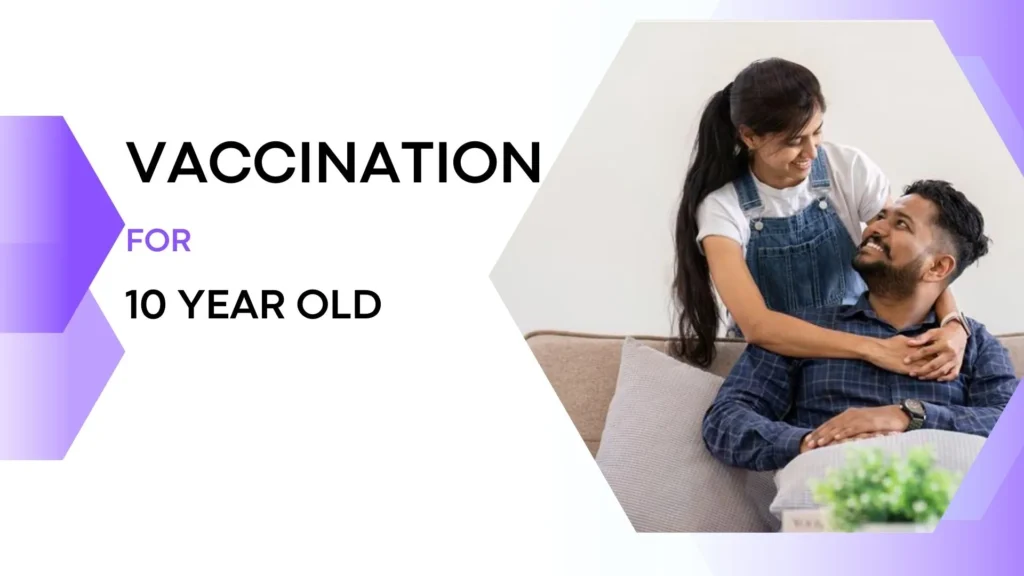As children grow, parents often feel a sense of relief that the most intensive vaccination years are behind them. However, vaccination for 10 year old children is just as important as early childhood immunizations.
At this age, vaccines help strengthen immunity, provide booster protection, and prepare children for adolescence when their bodies face new health challenges.
This guide explains everything parents need to know—why these vaccines matter, which ones are recommended, and how to make the experience stress-free for your child.
Simplify parenting with our app.
Click on This Link

Why Vaccination Is Important at Age 10?
By the time your child turns 10, immunity from some earlier vaccines may begin to fade. Booster doses ensure continued protection against serious illnesses that can otherwise return during adolescence.
Vaccination at this stage:
- Reinforces immunity built during early childhood
- Protects against infections common in school environments
- Reduces the risk of disease outbreaks
- Prepares the body for teenage years
Timely vaccination for 10 year old children also helps protect classmates, siblings, and vulnerable community members.
Recommended Vaccines for 10-Year-Old Children
While vaccine schedules may vary slightly by country or pediatrician, most doctors recommend the following at or around age 10:
1. Tdap (Tetanus, Diphtheria, and Pertussis) Booster
This booster protects against:
- Tetanus (lockjaw)
- Diphtheria
- Whooping cough (pertussis)
Whooping cough can be particularly dangerous and spreads easily in schools, making this booster essential.
2. HPV Vaccine (Optional but Strongly Recommended)
The Human Papillomavirus (HPV) vaccine is usually introduced between ages 9–12.
Benefits include:
- Protection against certain cancers later in life
- Stronger immune response when given at a younger age
- Long-term health benefits
Many parents hesitate due to a lack of information, but doctors recommend it as a preventive vaccine.
3. Annual Flu Vaccine
Children are exposed to multiple infections every school year. An annual flu shot helps reduce:
- Severe flu complications
- Missed school days
- Spread of illness at home
Catch-Up Vaccinations (If Missed Earlier)
If your child missed any vaccines earlier, age 10 is a good time to catch up. Your pediatrician may review and suggest protection against:
- Measles, Mumps, Rubella (MMR)
- Chickenpox (Varicella)
- Hepatitis B
A personalized plan ensures complete coverage and safe spacing between doses.
Is Vaccination Safe for 10-Year-Olds?
Yes. Vaccines recommended at this age are thoroughly tested and closely monitored for safety. Most side effects are mild and temporary, such as:
- Slight fever
- Pain or swelling at the injection site
- Fatigue for a day or two
Serious side effects are extremely rare. The benefits of vaccination far outweigh the risks, particularly in preventing life-threatening diseases.
How to Prepare Your Child for Vaccination?
Many children feel anxious about injections. Parents can help by:
- Explaining the purpose in simple words
- Avoiding fear-based language
- Offering reassurance and comfort
- Allowing them to ask questions
- Planning a small reward after the appointment
A calm parent often leads to a calm child.
Keeping Track of Vaccination Records
Maintaining accurate records is essential for school admissions, travel, and future medical care. Consider:
- Keeping both physical and digital records
- Setting reminders for upcoming vaccines
- Reviewing records during annual checkups
Digital health record apps can simplify tracking and reduce the risk of missed doses.
When to Consult Your Pediatrician?
Always talk to your child’s doctor if:
- Your child has allergies or a weak immune system
- You are unsure about past vaccination history
- Your child feels unwell before a scheduled dose
A pediatrician can guide you through a safe and customized vaccination for 10 year old plan.
How Can KidsCur Help?
Vaccination is not just about meeting a schedule—it’s about protecting your child’s future health. At age 10, children are growing rapidly, becoming more socially active, and facing greater exposure to infections.
Staying up to date with recommended vaccines ensures they stay healthy, confident, and protected as they enter adolescence.
Being informed today helps prevent serious health issues tomorrow. KidsCur makes vaccination tracking simple and stress-free for parents by acting as a smart digital companion for your child’s health.
Once you add your child’s date of birth, KidsCur automatically creates a personalized vaccination schedule based on age and recommended guidelines. Download the app now!

